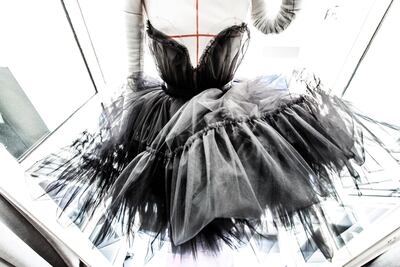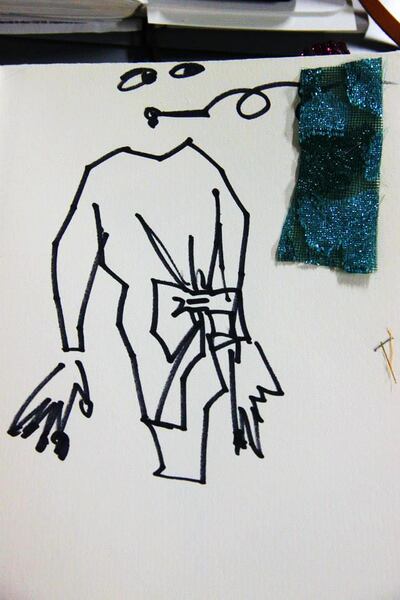In October 2019, luxury group Richemont announced that it was partnering with fashion designer Alber Elbaz on a new venture called AZ Fashion.
Although the new company is yet to launch and all preparations have been put on hold due to the Covid-19 pandemic, the designer has revealed that he started putting a team together before the global crisis.
"I had put the new team together and we started to work for a few weeks and then we had to go on quarantine, so it's only a beginning," he said in an online talk with The Business of Fashion founder Imran Amed this week.
“I realised that this is one of the times to whisper, to say it right, and to wait. There is nothing wrong with giving time and taking time and slowing down the system. I am trying to create a story with a company that is made-to-measure to what I believe in.”
This new label marks Elbaz’s first real venture back into the industry since 2015, when after 14 years at the helm of Lanvin, he was unceremoniously pushed out by owner Shaw-Lan Wang.
Despite achieving huge critical and financial success, the brutal nature of his exit rankled many, not least because Elbaz is widely regarded as one of the nicest people in the industry. This new partnership now marks something of a coup for Richemont, which also owns the Yoox Net-A-Porter group, Chloe, Cartier and Van Cleef and Arpels, among other brands.
Elbaz said he was "excited" about working with the luxury group, because "they are not only fashion".
"They are a company that produces watches – time itself – and jewellery. It’s all about long-term, not short-term. They whisper, they don’t shout.”
Deeply wounded by his treatment at Lanvin, Elbaz famously refused to join another house, preferring instead to stay low-key, with a few collaborations, biding his time until the right opportunity came about.
“One of the reasons why I didn’t feel comfortable to go back [into a fashion house] is that I didn’t want to just replace someone in his own work. It isn’t that I didn’t want to be the second wife, but it’s just about doing things from A to Z. Now this is a reset, a restart, a start-up. It has to be small, for me to start small.”
The new project may be a better fit with Elbaz’s ideas, however, he will be attempting to launch in the midst of a global pandemic. Though faced with a gloomy fiscal outlook, the designer is engagingly optimistic, preferring to see this as a moment of opportunity.
“During quarantine, I have been reading articles and history books and it shows that after every pandemic, every big war, there is a peak of economy and art, so now is the time to be optimistic about a better future,” he explained.
“We are now all thinking and observing about what is next. We are all looking for something different. It’s like the moment of truth."
A veteran of the industry, Elbaz lamented the failure of huge American stores such as Neiman Marcus and Barneys.
“For my new project, I thought it would be only online, but then I realised that part of being sustainable is supporting these stores. We need to work together.”
Part of that relationship, Elbaz insists, is helping get customers offline and back into brick-and mortar-stores. "What if we take online and do it on the shop floor?" he suggests. "Imagine if we take one of the big department stores and divide it not by designer, but divide it by category. All the white shirts are together, and all the coats. It's organised like an online store."
The optimistic designer is aware that this moment offers a unique opportunity to shift away from mindless excess and towards something more thoughtful and considered.
“People should not buy nothing, because part of what we do [as designers] is give joy to people. This is what fashion, art and design is all about," he said.
“Yes, I think there were too many shows, too many collections, we were travelling like there is no tomorrow, with no time to rest and think. For a long time, designers were pushed away from the driver’s seat and marketing was more important. But I have always said that what people want is not necessary what they would love to have.”
Despite the frustration of starting on a new venture only to have it put on hold, Elbaz has not stopped working. Citing endless Zoom conference calls with his new team, he is adamant that AZ Fashion in now, finally, under way.
“After 52 days, I have finished all the ideas I was working on, and this morning, I sent an email with all the things we are going to be doing and, yes, we are starting. After a long time of not being in love with fashion any more, I was looking to fall in love again. And I am happy to announce that I am.”
Company Profile
Name: Thndr
Started: 2019
Co-founders: Ahmad Hammouda and Seif Amr
Sector: FinTech
Headquarters: Egypt
UAE base: Hub71, Abu Dhabi
Current number of staff: More than 150
Funds raised: $22 million
The alternatives
• Founded in 2014, Telr is a payment aggregator and gateway with an office in Silicon Oasis. It’s e-commerce entry plan costs Dh349 monthly (plus VAT). QR codes direct customers to an online payment page and merchants can generate payments through messaging apps.
• Business Bay’s Pallapay claims 40,000-plus active merchants who can invoice customers and receive payment by card. Fees range from 1.99 per cent plus Dh1 per transaction depending on payment method and location, such as online or via UAE mobile.
• Tap started in May 2013 in Kuwait, allowing Middle East businesses to bill, accept, receive and make payments online “easier, faster and smoother” via goSell and goCollect. It supports more than 10,000 merchants. Monthly fees range from US$65-100, plus card charges of 2.75-3.75 per cent and Dh1.2 per sale.
• 2checkout’s “all-in-one payment gateway and merchant account” accepts payments in 200-plus markets for 2.4-3.9 per cent, plus a Dh1.2-Dh1.8 currency conversion charge. The US provider processes online shop and mobile transactions and has 17,000-plus active digital commerce users.
• PayPal is probably the best-known online goods payment method - usually used for eBay purchases - but can be used to receive funds, providing everyone’s signed up. Costs from 2.9 per cent plus Dh1.2 per transaction.
Mohammed bin Zayed Majlis
KILLING OF QASSEM SULEIMANI
Mohammed bin Zayed Majlis
Racecard
2pm Handicap Dh 90,000 1,800m
2.30pm Handicap Dh120,000 1,950m
3pm Handicap Dh105,000 1,600m
3.30pm Jebel Ali Classic Conditions Dh300,000 1,400m
4pm Maiden Dh75,000 1,600m
4.30pm Conditions Dh250,000 1,400m
5pm Maiden Dh75,000 1,600m
5.30pm Handicap Dh85,000 1,000m
The National selections:
2pm Arch Gold
2.30pm Conclusion
3pm Al Battar
3.30pm Golden Jaguar
4pm Al Motayar
4.30pm Tapi Sioux
5pm Leadership
5.30pm Dahawi
Europe wide
Some of French groups are threatening Friday to continue their journey to Brussels, the capital of Belgium and the European Union, and to meet up with drivers from other countries on Monday.
Belgian authorities joined French police in banning the threatened blockade. A similar lorry cavalcade was planned for Friday in Vienna but cancelled after authorities prohibited it.
Hotel Silence
Auður Ava Ólafsdóttir
Pushkin Press
The Voice of Hind Rajab
Starring: Saja Kilani, Clara Khoury, Motaz Malhees
Director: Kaouther Ben Hania
Rating: 4/5
Killing of Qassem Suleimani
UAE currency: the story behind the money in your pockets
The five pillars of Islam
Killing of Qassem Suleimani
$1,000 award for 1,000 days on madrasa portal
Daily cash awards of $1,000 dollars will sweeten the Madrasa e-learning project by tempting more pupils to an education portal to deepen their understanding of math and sciences.
School children are required to watch an educational video each day and answer a question related to it. They then enter into a raffle draw for the $1,000 prize.
“We are targeting everyone who wants to learn. This will be $1,000 for 1,000 days so there will be a winner every day for 1,000 days,” said Sara Al Nuaimi, project manager of the Madrasa e-learning platform that was launched on Tuesday by the Vice President and Ruler of Dubai, to reach Arab pupils from kindergarten to grade 12 with educational videos.
“The objective of the Madrasa is to become the number one reference for all Arab students in the world. The 5,000 videos we have online is just the beginning, we have big ambitions. Today in the Arab world there are 50 million students. We want to reach everyone who is willing to learn.”
UAE currency: the story behind the money in your pockets
Zayed Sustainability Prize
The%20Woman%20King%20
%3Cp%3E%3Cstrong%3EDirector%3A%3C%2Fstrong%3E%20Gina%20Prince-Bythewood%3C%2Fp%3E%0A%3Cp%3E%3Cstrong%3EStars%3A%3C%2Fstrong%3E%20Viola%20Davis%2C%20Thuso%20Mbedu%2C%20Sheila%20Atim%2C%20Lashana%20Lynch%2C%20John%20Boyega%C2%A0%3C%2Fp%3E%0A%3Cp%3E%3Cstrong%3ERating%3A%3C%2Fstrong%3E%203%2F5%3C%2Fp%3E%0A
More on Quran memorisation:
UAE SQUAD
Khalid Essa (Al Ain), Ali Khaseif (Al Jazira), Adel Al Hosani (Sharjah), Mahmoud Khamis (Al Nasr), Yousef Jaber (Shabab Al Ahli Dubai), Khalifa Al Hammadi (Jazira), Salem Rashid (Jazira), Shaheen Abdelrahman (Sharjah), Faris Juma (Al Wahda), Mohammed Shaker (Al Ain), Mohammed Barghash (Wahda), Abdulaziz Haikal (Shabab Al Ahli), Ahmed Barman (Al Ain), Khamis Esmail (Wahda), Khaled Bawazir (Sharjah), Majed Surour (Sharjah), Abdullah Ramadan (Jazira), Mohammed Al Attas (Jazira), Fabio De Lima (Al Wasl), Bandar Al Ahbabi (Al Ain), Khalfan Mubarak (Jazira), Habib Fardan (Nasr), Khalil Ibrahim (Wahda), Ali Mabkhout (Jazira), Ali Saleh (Wasl), Caio (Al Ain), Sebastian Tagliabue (Nasr).
LIVING IN...
This article is part of a guide on where to live in the UAE. Our reporters will profile some of the country’s most desirable districts, provide an estimate of rental prices and introduce you to some of the residents who call each area home.
The five pillars of Islam
Results
Ashraf Ghani 50.64 per cent
Abdullah Abdullah 39.52 per cent
Gulbuddin Hekmatyar 3.85 per cent
Rahmatullah Nabil 1.8 per cent




